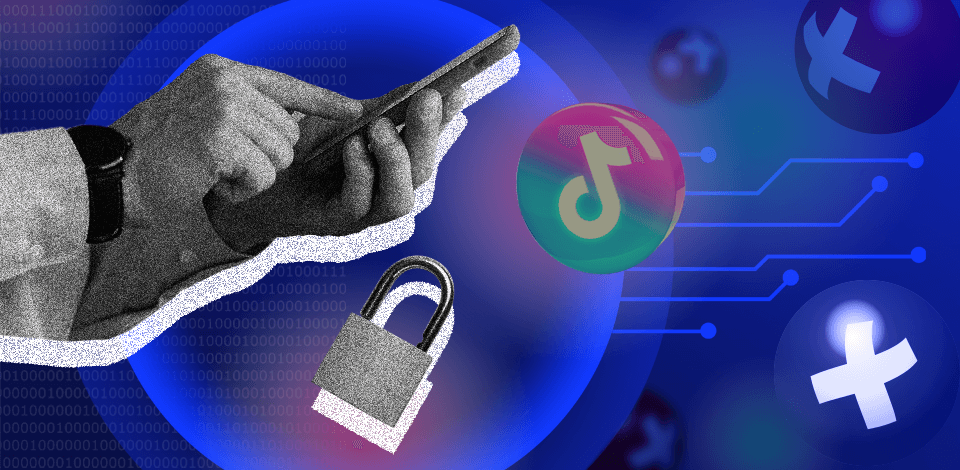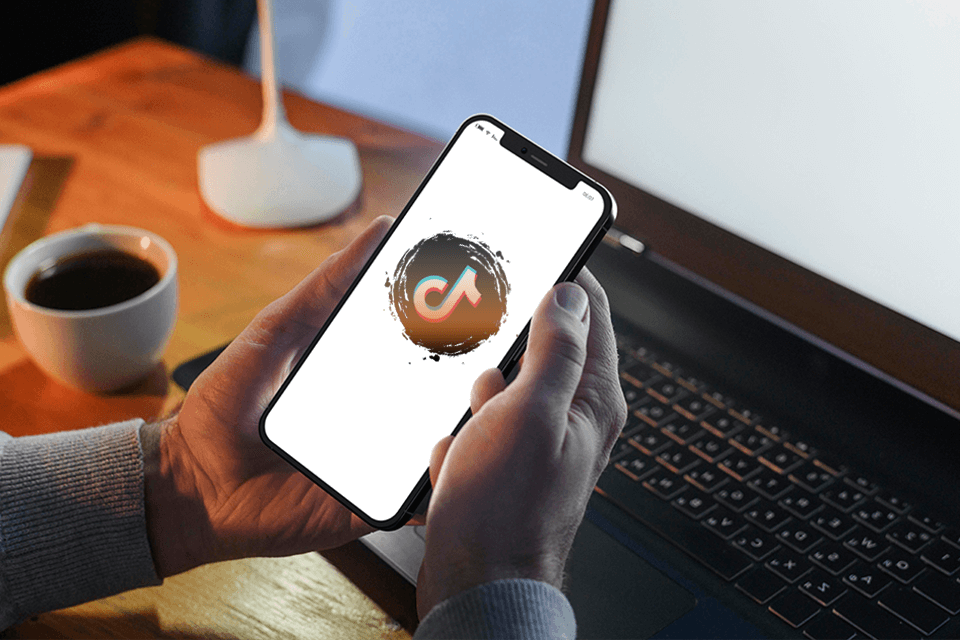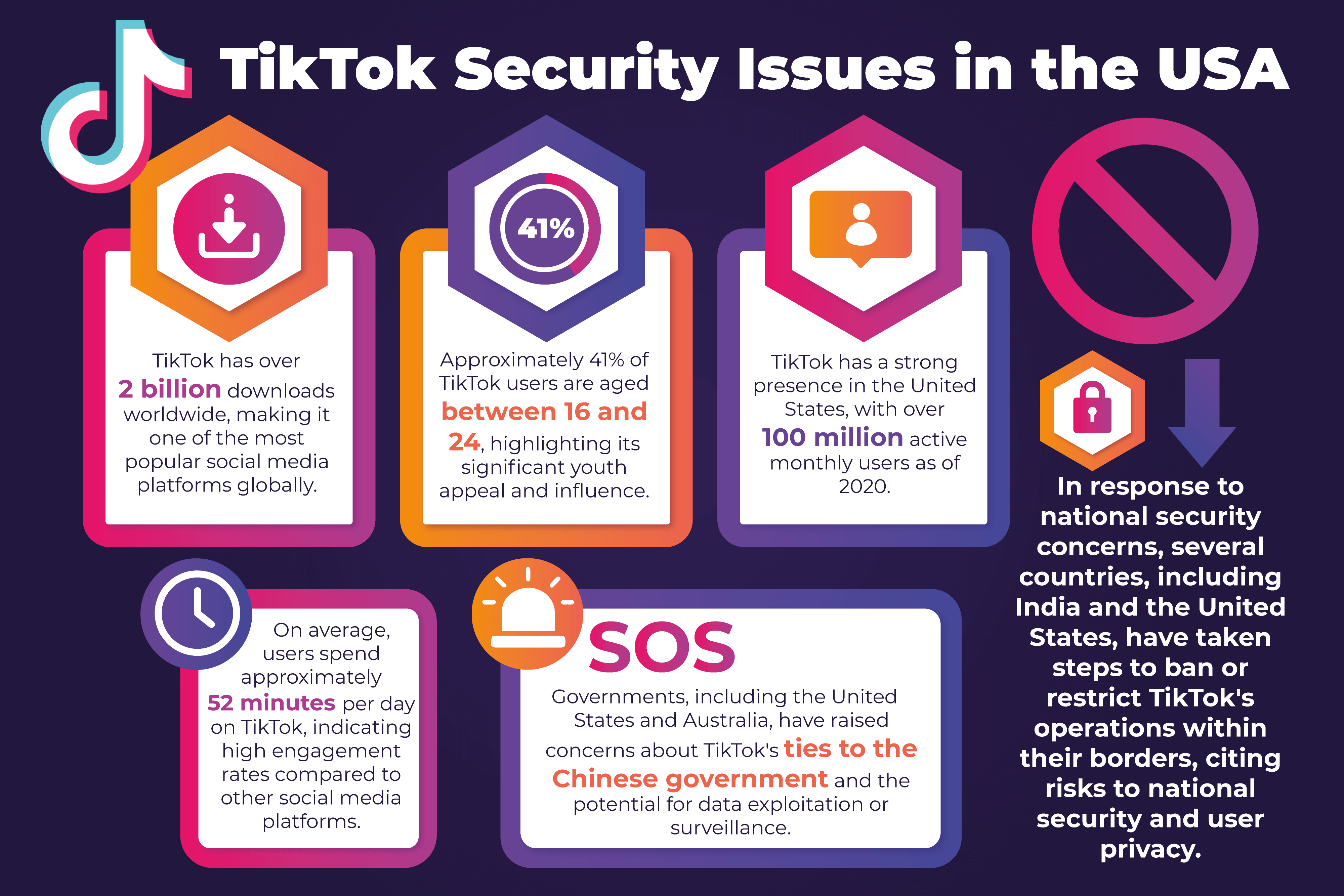
The recent talks about TikTok security issues have caused a stir worldwide. What’s more, the possibility of using the social network in the US has become questionable. People name 3 main potential threats:

TikTok is a video editing app for making and sharing short videos, lasting minimum 15 seconds. You can jazz up your videos with cool filters, music, and stickers, making them amusing and unique, especially when synchronized with dance moves.
The app has been downloaded 1.5 billion times globally. Roughly one-third of the people who use it every month are teenagers.
Regardless of the above-mentioned security issues with TikTok, it is still immensely popular among users due to several reasons:
People often ask about the kind of data the app gathers and whether it's safe to use. Just like Facebook and other social media platforms, TikTok collects lots of user data.
| TikTok collects by default | TikTok collects with user permission |
|---|---|
|
Info about every TikTok video you watch |
Your exact location |
|
Time of watching |
Your phone’s contacts and other social network connections |
|
The entire contents of every message you send |
Your age and phone number |
|
Country location, internet address and type of device you are using |
Payment data |
This data can be used to create a profile of you for targeted advertising. In other words, the app will “understand” your identity, your connections with friends and family, your preferences, interests, and the conversations you have with your mates.
TikTok uses technical methods to encrypt its activity. This means that some of its actions are kept secret from researchers outside the company. Developers claim it is necessary to prevent hackers and other malicious individuals from harming users.

In accordance with the New York Times, the CIA supposedly looked into TikTok and didn't discover any clear evidence suggesting that Chinese intelligence agencies were spying on users. However, there still appear strong negative reactions:
In 2020, Apple discovered a problem with iOS 14 where some apps could access a user's device clipboard without their knowledge. TikTok was one of these apps. The company explained that this occurred because of an anti-spam filter that detected users copying the same comment to multiple accounts on one device. The developers acknowledged the problem and removed the feature.
In December 2022, the company admitted that some employees had used location data to spy on reporters, trying to find out who was leaking information. TikTok's parent company ByteDance stated that these employees were fired. Moreover, Forbes said last October that TikTok intended to monitor the locations of certain U.S. citizens using data from their devices.
TikTok security issue that's less discussed is the lack of two-factor authentication. TikTok lets you log in with a code sent to your phone, but it's only for one-off use. Many social platforms typically only use a single form of authentication, like just a password.
If you have a weak password, there may arise security problems like phishing or ransomware attacks. Luckily, lots of social media sites now have two-factor authentication for extra security. So, TikTok users should use third-party privacy management software like Surfshark One.

According to TikTok's official rules, users must be at least 13 years old to use the app. This age requirement is similar to other social networks like Facebook, Instagram, Twitter, and Snapchat.
Based on TikTok's guidelines, users under 18 need their parent or guardian's permission to use the app. It's important to make sure your child has entered their real age when signing up, instead of a fake one that makes them seem older. Otherwise, they may see inappropriate content.
When children use the app without proper supervision from adults, it can lead to potential risks such as:
Such dangers in addition to excessive screen time can negatively impact children’s well-being.
If you want to protect your privacy and keep your kids safe on TikTok, you can take the following steps:
 Surfshark Alert constantly checks online sources and if it finds out that user’s TikTok login information has been leaked in a data breach, it notifies them immediately. Thus, they can act fast to secure their accounts.
Surfshark Alert constantly checks online sources and if it finds out that user’s TikTok login information has been leaked in a data breach, it notifies them immediately. Thus, they can act fast to secure their accounts.Surfshark Alerts sends TikTok users timely messages if their passwords are at risk or if there's been a data breach.
While there are a lot of debates about national security issues with TikTok, most users don't have sensitive content on their phones. For average people, the risk is the same as when using other popular social media apps. It's important to know about data security and then decide for yourself.
Parents can use the parental control feature in Surfshark One. They can set up filters to block inappropriate content, limit screen time, and keep an eye on what their children are browsing.
TikTok uses both physical and digital security measures like gated entry points, firewalls, and intrusion detection technologies. They make sure only employees who need to see user data can access it.
Messages on TikTok are scrambled when they're stored and while they're being sent. But, they don't yet use end-to-end encryption.
TikTok gathers information about your device, like what type it is, where you are, your IP address, what you've searched for, the messages you've sent, what you're watching, and how long you spend on the app. It also tracks how you interact with ads using device identifiers. However, you can protect some of this information by using dedicated VPN services.